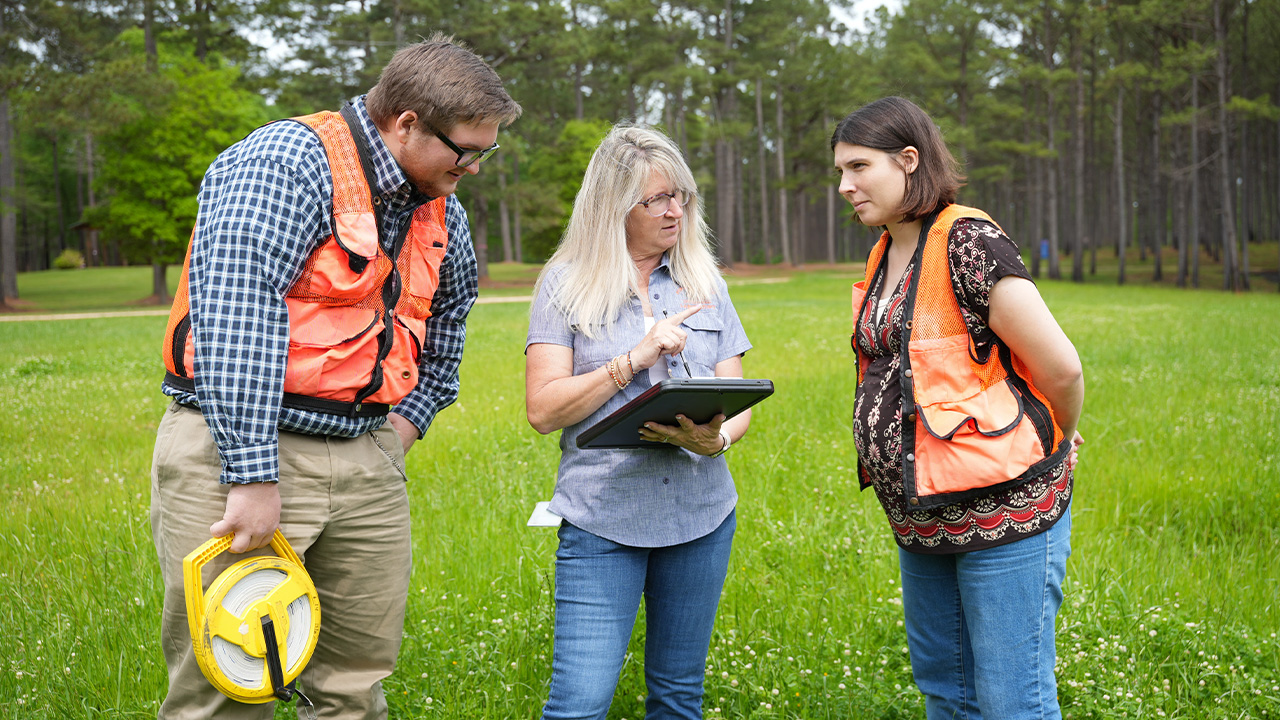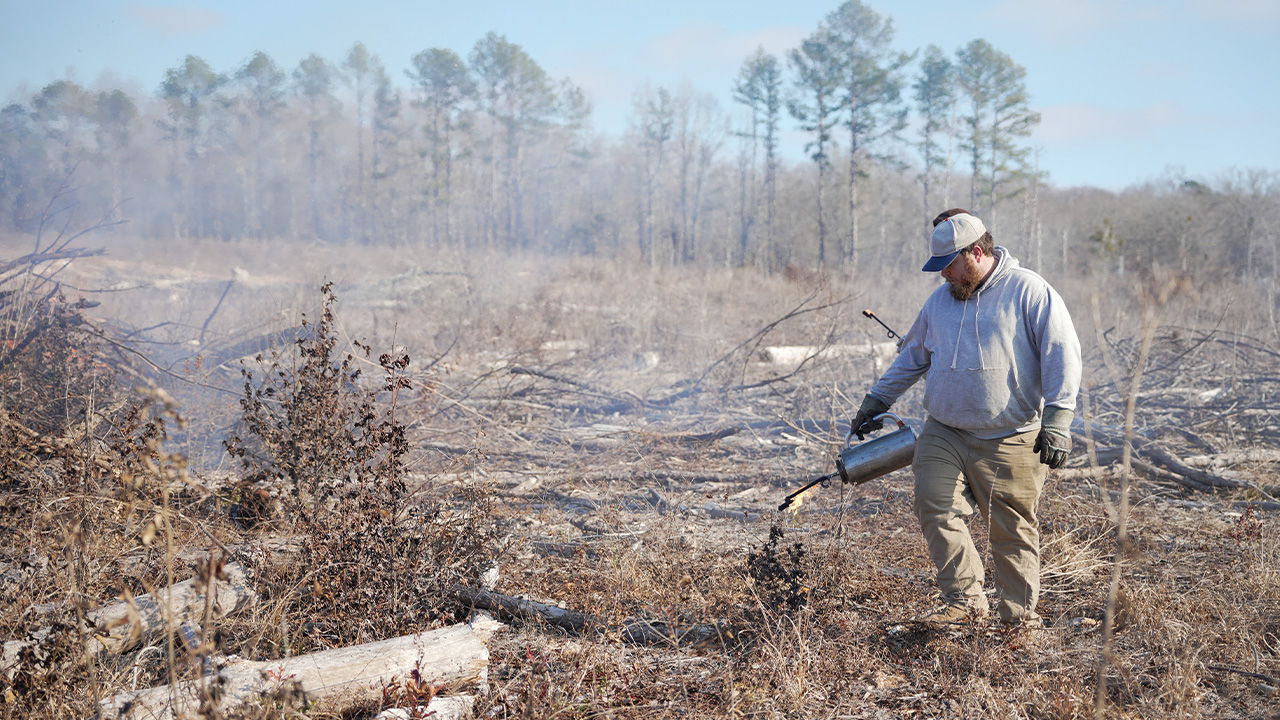content body
You don’t need a green thumb to enjoy the beauty of a blooming azalea bush or a flourishing garden. But you may have never considered that a garden could have a superpower.
Unless, of course, you are Lori Eckhardt.
This professor at Auburn University’s College of Forestry, Wildlife and Environment (CFWE) understands the power of gardens to be a first line of defense against plant diseases, pests and environmental changes.
Eckhardt earned funding to partner with the City of Mobile, Alabama, and the Alabama Port Authority to strategically locate sentinel gardens at the Port of Mobile as early warning systems for potential invaders.
Preventing large-scale damage
While precise annual figures are challenging to determine, shipping ports are a significant entry point for invasive pathogens and insects to enter the United States. And once here, invasive species cause major economic losses — with the forest industry losing $4.2 billion annually.
Invasive plant pests and diseases can wreak havoc on once-healthy native species and often go undetected until it’s too late. But improved prevention could soon be a reality with the addition of sentinel gardens to the Port of Mobile.

Logan Schatz (left), Jessica Baldwin (center) and Professor Lori Eckhardt (right) measure the area for the sentinel garden at the Mary Olive Thomas Demonstration Forest.
These gardens have been successfully used worldwide as early detection systems before pests or diseases can cause large-scale damage.
This proactive application has been endorsed by the U.S. Department of Agriculture, the European and Mediterranean Plant Protection Organization, UN Food and Agriculture Organization of the United Kingdoms and other reputable global associations.
The Port of Mobile sentinel garden project is currently underway. Eckhardt secured funding from the U.S. Forest Service and has met with both the city and the port.
“We have secured the locations in which to establish the sentinel gardens, strategized the timing to establish the gardens in late fall or early winter and are determining which species should be planted,” Eckhardt said.
Designed to monitor and detect the presence of plant diseases, pests and environmental changes, these gardens are strategically placed in key locations to identify impending threats to agriculture, forests and native ecosystems.
“In our case, we will look at the economically, ecologically and culturally important tree and shrub species found within Alabama’s forests,” Eckhardt said.
Species selection underway
While not yet comprehensive, the list of species to be included in the sentinel gardens is starting to come together.
As for trees, loblolly pine, longleaf pine, pecan and bald cypress were selected due to their importance to the state of Alabama.

Eckhardt chose species like the shrub "American beautyberry" for the sentinel gardens because of their ecological, cultural and aesthetic value.
Loblolly pine is the most widely planted pine species in the Southeast, and longleaf pine is a keystone species in the longleaf pine ecosystem. Highly produced in Alabama, pecan is a valuable nut crop used domestically and exported, and the presence of bald cypress stabilizes ecosystems and helps with flood control and water purification.
“In short, these trees reflect Alabama’s rich natural resources, support key industries and embody aspects of Southern identity and tradition,” said Eckhardt.
The shrubs thus far selected for the sentinel gardens — rhododendron, sassafras and beautyberry — hold ecological, cultural and aesthetic value in Alabama.
Eckhardt recognizes that, “while these shrubs may not have the same commercial weight as pines or pecans, they contribute significantly to Alabama’s biodiversity, traditional knowledge and natural beauty.”
That said, they have important functions: rhododendrons offer habitat and nectar for pollinators; sassafras hosts several butterfly species and provides birds and small mammals food; and beautyberry provides critical seasonal food for deer, birds and small mammals.
Students monitor, educate, advocate
Once the gardens are up and running, CFWE students will play an active role in garden research and education.
“They will be engaged in monitoring and data collection, community education and awareness campaigns and policy and advocacy engagement,” said Eckhardt.
Sophomore Logan Schatz, a mechanical engineering major, is already involved with the project. One aspect he quickly learned about was how critical yet difficult it is to monitor and understand diseases.
“With the global highways we’ve created, the potential for invasive diseases to land within and infect our ecosystems is incredibly high,” said Schatz.
Schatz looks forward to the process of designing the gardens, as design optimization is “a passion” of his.
“Since we have limited space, the gardens need to be optimized to make efficient use of the designated land but also to be healthy and ideally attractive,” Schatz said.
Eckhardt is in recruitment mode now, looking for students to participate as well as community groups interested in citizen science.
With a formidable team in place, Eckhardt should experience no difficulty achieving the project’s straightforward objectives. First, establish the sentinel plantings. Next, develop educational programming for communities surrounding the Port of Mobile. Lastly, conduct sentinel planting at CFWE’s Mary Olive Thomas Demonstration Forest.
“Planting on a campus property enables our team to both monitor the plants and offer a training and education facility for citizen science groups, extension, master gardeners, 4-H and Future Farmers of America (FFA), scouts and K-12 classes,” said Eckhardt.
Sentinel gardens partners
Alabama Department of Agriculture; Alabama Department of Conservation and Natural Resources; Alabama Forestry Commission; Alabama Forestry Association; Master Gardeners Chapters; National Forests and Parks; Natural Resources Conservation Service; U.S. Forest Service; Urban Foresters; and USFS-Forest Health Protection.Partners participate in many ways
Project partnerships are central to the success of the Port of Mobile’s sentinel gardens.
Partners help acquire funding, determine which species to plant and assist with garden design, monitoring protocols and training. According to Eckhardt, they will also connect with other people and organizations who are interested in participating in the gardens in some way.
The proactive power of prevention
The benefits of these proactive efforts will be substantial and impactful.
“Sentinel gardens provide an early detection system of threats, help prevent the spread of invasive species, help researchers understand the behavior of invasives, provide data for global monitoring networks and support integrated pest and disease management,” said Eckhardt.
These gardens can diminish the economic, ecological and agricultural damage caused by threatening pests and diseases.
“This proactive approach also minimizes reliance on chemical treatments, helps conserve biodiversity and supports sustainable land management,” Eckhardt said.






